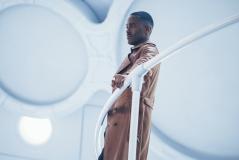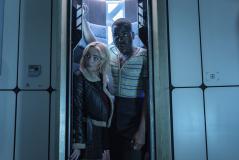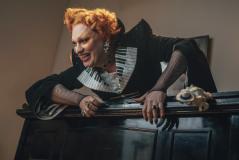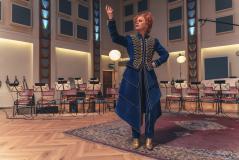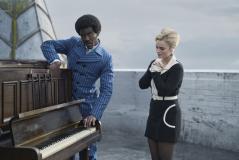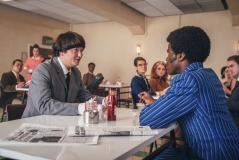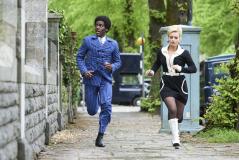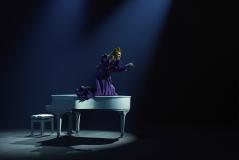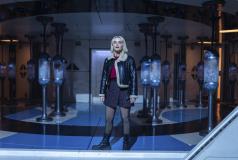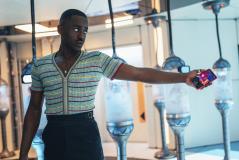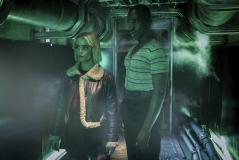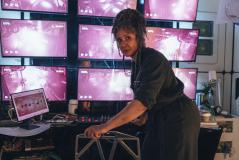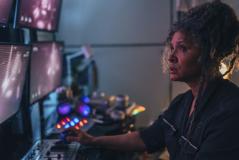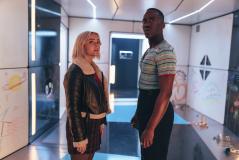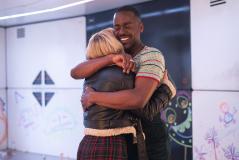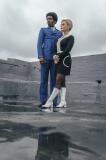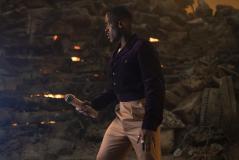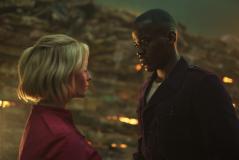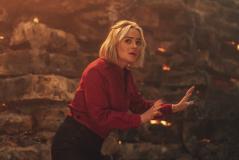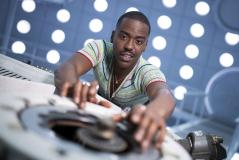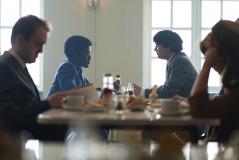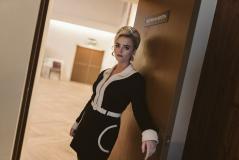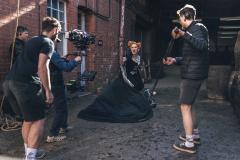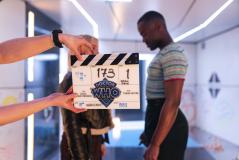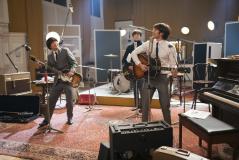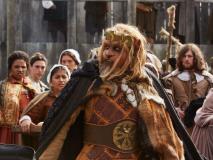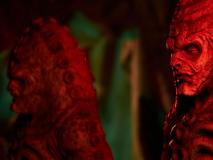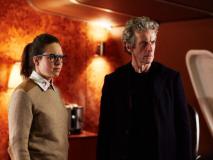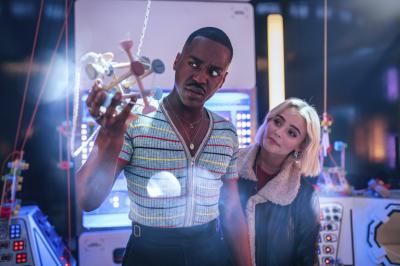
The new series of Dcotor Who arrives on screens worldwide this weekend.
Inside the UK the first two new episodes of the season will premiere at midnight on May 11 on BBC iPlayer, and then on BBC One later that day.
‘Space Babies’ will air on BBC One at 6:20pm followed by ‘The Devil’s Chord’ at 7:05pm.
Episodes will drop on BBC iPlayer followed by a primetime slot on BBC One each week following that.
Outside the UK, Doctor Who begins streaming 10 May at 7pm ET on Disney+, where available, giving audiences a simultaneous global launch.
SPACE BABIES - OFFICIAL SYNOPSIS:
Ruby learns the Doctor’s amazing secrets, when he takes her to the far future. There, they find a Baby Farm being run by babies. But can they be saved from the terrifying Bogeyman?
THE DEVIL’S CHORD – OFFICIAL SYNOPSIS:
The Doctor and Ruby meet the Beatles, but discover that the all-powerful Maestro is changing history. London becomes a battleground with the future of humanity at stake.
Q: What made you so eager to come back to the helm of Doctor Who?
A: I just love the show. I have loved it all my life. I think about it all the time. It's not like I ever stopped thinking about it really. I have every single issue of Doctor Who Magazine in a special cabinet with a glass front. I used to smoke, so that would protect the magazines from my cigarette smoke. That's how much I love the show.
Q: Why is now the right time for you to return to Doctor Who?
A: All those years while I was away, I was beginning to think about what the future of Doctor Who looks like. And then the BBC hijacked me on a Zoom - they trapped me! They sprung their ambitions on me to make Doctor Who bigger, with worldwide streaming, a simultaneous drop, a production partner with a global scale and ambition. And it literally fit exactly what I thought the show should be doing. I think I actually said ‘yes’ on the spot. You’re not supposed to do that. You're supposed to say, ‘Let me go away and think about this.’
Q: What part did you play when speaking to potential streaming partners?
A: I pitched the concept of the entire first series. There were no scripts, but I worked out the rough format of how it would go and the shape of it and what it would look and feel like.
Really, I just described the fundamentals of travel in time and space, anywhere in history, anywhere in the future, any planet, any genre. That’s the important thing to understand about Doctor Who. It's very rare. We can have a comedy one week, a terror the next week, a haunted house the next week and a thriller the next week. That's very unusual. I was selling it from scratch, really, but always emphasising the Doctor and the companion as the heart of it. And it worked. And now here we are. Hurray!
Q: What convinced you to cast Ncuti Gatwa as the new Doctor?
A: He's already one of our great actors. In Sex Education, you couldn't take your eyes off him. I literally swear, in five years’ time, you’ll have the next James Bond right here. I'll be being held back by security, saying “I know him!”
I consider myself to be the luckiest man on earth that in the year that I came along to take over Doctor Who, Ncuti Gatwa was coming to the end of his time on Sex Education. I’m so lucky that happened. It just looks like it was meant to be.
When you see him in action as the Doctor, he's just astonishing. I had to have a few words with myself. I thought, ‘You have done a few Doctors now, can you do it again? Are you going to get excited? Are you going to get energised?’ And then you look at Ncuti doing the role, and it's like a brand-new playing field. It's open vistas and new horizons ahead of you. It's so exciting that it inspires me. It generates stories in me. It's an absolute joy to work with him.
Q: What qualities does Ncuti have that work so well in the Doctor?
A: He’s limitless. That's really all you look for in every single actor. I've been so lucky over the years to work with people like this. There’s a certain breed of limitless actors who are unafraid to go anywhere or do anything. An awful lot of acting is wanting to be liked, but they don't care about that. The good ones just want to be, to exist and to ride to the emotion, whether it is terror, or joy or all the emotions in between. And you're never quite sure where they're going to go. There’s a great feeling of the unexpected. In a recording session, I listened to a line that Ncuti delivered off camera and it made me burst out laughing because it went the opposite way to what I was expecting. I was taken by surprise, and that’s a lovely thing.
Q: What other characteristics does Ncuti possess that inform this version of the Doctor?
A: Quite by chance, I wanted a more emotional Doctor, and lo and behold, we have cast someone whose emotions are vast, turbulent, and visible. He cries when it’s sad, he laughs when it's funny, and he's got the biggest smile in the whole universe. When fear or suspicion play across his face, he signals wildly to the camera what's going on. You can’t miss it. Historically, Doctors have tended to keep their emotions to themselves and play the game of being reserved. And the actors have done that brilliantly. But right now in 2024, I want a man who cries when it's sad. And Ncuti does that to an astonishing degree. I just genuinely feel lucky to be part of this now. With him in the TARDIS, it is wonderful.
Q: What does Millie bring to the role of Ruby?
A: She is just tremendous. She also brings an awful lot of experience – she has been in Coronation Street since she was 14 years old. I was watching the show for the entire time that Millie was in it. I used to watch agog as they piled more and more plots on her. I've worked on soaps, and I know how they work. I literally sat there thinking, ‘The writers love her.’ I know some of the writers and they told me, ‘Oh my God, she's terrific.’ I consider myself to be so lucky because as we turned our wheel round to look for a new companion for Doctor Who, she decided to leave Coronation Street – to the extent that literally her last episode transmitted on a Friday night and she walked into the audition on the Saturday morning. That’s amazing. That makes you think it was meant to be.
I don’t need to tell you how much skill she's got, how much energy she's got, how much life she's got, how much comedy she's got. She's immensely skilful at comedy, and that's very rare. She's got salt, she’s got spice, she's got fire. But I particularly love the fact she's genuine a 19-year-old playing a 19-year-old. That’s very rare. A 19-year-old playing a 19-year-old brings an energy that an older actor couldn’t. I wanted that. I wanted those open eyes. She is like the viewer who has never watched Doctor Who before. She brings a freshness and a newness and a joy to it. It's really lovely to see. I'm so pleased that it worked.
Q: Is there a theme that runs throughout the season?
A: You could watch every single episode separately without bogging yourself down with continuity. But as we saw at Christmas, there is obviously a mystery to Ruby's birth family. She was a foundling left at a church. It is a fairy tale like story, but it keeps following her. That story is not finished. Who is her mother? How can they possibly find out what went on? The way the Doctor ties into this is fascinating. This emotional man I've been talking about opens up about his family in a way that he's never done before.
He left his family behind in 1963 and practically never mentioned it again. That's a man who doesn't know his family, and that is fascinating. So as his mind is focusing on that, Ruby's mind is focusing on her family. Those two stories come together in possibly the greatest finale ever committed to film, except we don't actually use film anymore! But it really is an astonishing climax.
Q: How have you developed the character of the Doctor in this series?
A: I was thinking, ‘What is a hero for a young audience?’ Because for a while when I was not working on the show, I started to think that a lot of action heroes and other superheroes just punch people to sort things out. Even Star Wars characters carry a phaser, and heroes have lightsabers. But the defining feature of the Doctor is that they don’t carry a weapon, and, quite profoundly, he makes jokes in the face of danger.
That is the unique and wonderful thing about the Doctor. I love them for that. Our audience now is much more emotionally connected with the world. Six years olds are much freer in this day and age to say whether they're unhappy, or whether they're happy. We encourage them to talk about their feelings. It’s time for a new Doctor who carries those emotions on the surface more visibly instead of hiding them away. The Doctor doesn’t just wear one heart on their sleeve; they wear two hearts on their sleeve. I thought it was just the right time for that to be centre stage. And that’s what I’m here to do.
Q: After 61 years, how does Doctor Who stay so fresh?
A: It's not like I have to walk in with any special skills; the show keeps refreshing itself. Every week, he lands somewhere new. Every week, he meets a new person, a new enemy, a new friend. And that's lovely. That does mean that a lot of stuff has been covered. We have to be wary of anything set in the Dickensian era or landing in World War II once too often, except sometimes those are the loveliest stories of all, so you just have to take a deep breath and say, ‘That works.’ But as long as you keep it fresh, it will succeed.
That comes naturally. It's 2024, so we're all writing a show that sounds like it's in 2024. That means you're not delivering something they would have delivered the 60’s. We have new attitudes, new morals, new insights into people. The world has changed. And as long as you continue to do that in the dialogue, in the stories and the attitudes, then we will stay on top of the wave. I think that’s important.
Q: How do you hope viewers will respond to this series?
A: Most importantly, I hope and I know this will happen in some shape or form, that some six-year-old will start to draw that blue box and will run around the school yard with a sonic screwdriver, and will start to think of stories and in 30 years’ time will be sitting doing an interview for their own show.
Q: One of the Doctor’s greatest traits is that he is always remarkably tolerant, isn’t it?
A: Absolutely. He steps out of the TARDIS and he’s happy to meet whoever, whether they have two heads, three heads or are from 1660 or 3060. He is a man – and he has also been a woman – who's happy to travel. He is simply accepting of everything and everyone. If they cross the line, he’ll do everything to stop them. But until then, he is the universe’s friend, I think it's a great example for children – and adults. Now is the time for the Doctor. Please step out of the TARDIS. We need you!
Q: How did you react when you heard you had got the part of The Doctor?
A: My agent called to tell me I had the role just as I was walking into the barbershop. I think I was paralysed by the weight of 60 year history. No pressure! I was very, very overwhelmed. But I felt like I had a little piece of gold.
Q: Did you understand at that point how massive the Whoniverse is?
A: No! I feel quite silly that I didn't comprehend the sheer scale of it beforehand. But once I stepped into the world, I realised how huge it is. I thought, ‘Well, of course, it’s Doctor Who!’ I immediately understood why it’s a show we all know and love. It just takes your breath away, how far-reaching the scope of the show is. You embrace the fandom. The fans absolutely make the show what it is. They're the final character.
Q: There’s a real excitement surrounding this new series? Talk about that.
A: Absolutely. It’s really nice to have that buzz around Doctor Who. It's a great show, and I feel very lucky to have the baton handed on to me for such an incredible drama. This is a really exciting time.
Q: Did the other Doctors give you advice about the role?
A: Yes. They have been amazing, so supportive. I bumped into Matt Smith at a party before I was allowed to announce it to anyone. I told him I was following in his footsteps, and he had no idea what I was talking about. But when it was announced, he texted me – ‘Aah, now I get it!’ He was so lovely. He was like, ‘Take it all in your stride. If you ever need any advice, here's my number, send me a text.’ Now that I'm in the role I get what they mean. What it’s like to play that role is not something that anyone else can understand. I’m very grateful for their support.
Q: There are only just over a dozen people in history who have ever played the role. So it's an extraordinary, exclusive club to belong to, isn’t it?
A: It’s mind-boggling! They've all been great actors, and just through their performances they have informed and supported me as well because they have given so many defining interpretations of the character. I was able to pick and choose things they did and throw them into the mix for my interpretation.
Q: Where did you watch the Christmas Special?
A: I spent Christmas in London. My friends came round and we had turkey and watched the episode together. I watched it from behind my hands. I wanted to watch it from behind the sofa because I find it so cringe-worthy seeing myself on screen. But my friends managed to coax me out of that!
Q: What was your friends’ response?
A: They loved it! They saw what we’re trying to do. It’s the Doctor Who that we know and love, but it's also a completely brand-new show. Russell has really got hold of it and pushed it forward to become a show that can compete with any huge franchise now. We've got so much competition in terms of sci-fi and fantasy, but Russell's taken it into an arena where it can really compete. But it also retains the British charm that we all adore. It was really nice to know that came across as well.
Q: Can you talk about some of the monsters that the Doctor will be meeting in new series?
A: Russell's brain has managed to create a whole new level of monster that's really terrifying! In the first episode, for instance, the monster is so scary. When I heard about it, I thought, ‘Oh, that's a nice beginning-of-the-series monster to warn the audience about what’s to come. It’s on the same level of scariness as the Goblin King.’ But then I saw the actual costume and it is absolutely terrifying. I was so shocked! We certainly are on track to get a whole new generation of kids hiding behind the sofa!
Q: Can you tease any major storylines?
A: What I can say is that Russell is a master at creating a certain intricate world. And he's doing so already. So that's going to be really exciting for the fans to piece things together.
Q: Do you have a favourite moment from the series?
A: I'd say Rogue was my favourite. Millie and I just had a blast. The Doctor and Ruby are very excited to go to the Regency era, and Millie and I had very similar sentiments. We were excited about our costumes which were amazing. And it was incredible working with Jonathan Groff as well. He's an amazing actor. He brings such gravitas to the episode.
Q: Is there an overarching theme in this series?
A: Yes - It’s to do with family. The mystery of Ruby Sunday is the overriding theme of this season. We saw in the Christmas special that the Doctor and Ruby bond over the fact that they both orphans, they are foundlings.
Q: What are the key characteristics of your Doctor?
A: I would describe him as a bit cheeky and confident, but there is also a depth to him, emotionally. The character is very emotionally strong. This Doctor wears his heart on his sleeve.
Q: Also, there has always been a note of sadness about him because, however much he loves his companions, ultimately, he’s always alone.
A: He's certainly quite a loner. It’s a solitary existence just constantly regenerating. He’s been travelling since time immemorial. So that's a lonely existence because mere mortals come and go and have human lifespans, and my Doctor makes a lot of jokes about that! There is an element of his character that's constantly searching for something, but also constantly running away from something. That’s a really nice dynamic to play.
Q: How would you characterise the relationship between the Doctor and Ruby?
A: They are definitely best friends, but also big brother, little sister. He feels very protective towards her. But they can’t help but have a bunch of fun together. They're both very curious, very cheeky, and have got very high-energy personalities. They are bouncing off each other constantly.
Q: What is it like working with Millie?
A: It’s incredible. She’s a great actor, and she’s delightful. She charmed us all the moment we met her, and that never stopped. She helps define the energy of my character. It was the missing element. As soon as the companion walked in, the energy and the chemistry were just there. Millie and I had never met before, but we just hit the ground running. That dynamic between the Doctor and the companion just worked instantly. Millie is the perfect person for this new era. Of course, as we know, the companion is the eyes of the audience. And what Millie brings is a lightness and a curiosity, but also something real and deep. I think that's the perfect vessel for the audience to join us in the new era. Millie brings so much to the table.
Q: What makes Russell’s writing so special?
A: I think he brilliantly captures the human condition at the same time as taking us to times we couldn't imagine. He's really good at putting the micro and the macro right beside each other, light and darkness, tragedy and comedy. He’s excellent at writing duality. He’s also not afraid to be a little bit dangerous as well. And that makes things really exciting.
Q: Have you been impressed by the Doctor Who fan art?
A: Absolutely. After the Christmas episode, the fan art just exploded. I was so blown away by the talent, but also by the love for the show. It's really overwhelming. There are some incredible artists in the Whovian Family.
Q: Did one particular work of art stand out for you?
A: I posted on my Instagram a picture someone had drawn of William Hartnell handing me the keys to the TARDIS. That one gave me a lump in my throat. It was amazing. Talk about the history of the show summed up in one picture. This show has carried many a generation and it just feels wild to be a part of it.
Q: Doctor Who is now more widely loved than ever. What is it that people adore about the show?
A: One thing that sticks out in my mind is when I hear people talk about how they share Doctor Who with multiple generations. You often hear people say, ‘I watched the show with my dad or with my grandma,’ or some other member of the family has introduced them to the show. That is really nice because it's a family show. I guess the show is like a member of our family. We all grew up with it.
Q: Could you give us a summary of this series in five words?
A: It'll blow your socks off
Q: What are your memories of watching the Christmas special, the first Doctor Who episode in which you appeared?
A: It’s all a bit of a blur. I love my dad’s cooking, and I remember on Christmas Day we were all sat down to eat it. But I was like, “I can't eat my dad's food” because I was so nervous. But I was with all my close family in a very protected bubble, so I felt safe. They were all being very supportive but at the same time not making it a big deal. It took a bit of getting used to that it was being played worldwide. But as soon as it came on, it felt like it was just us watching it in my living room. It wasn't the rest of the world as well!
Q: How did you feel when the reaction to the Christmas episode was so universally positive?
A: We were absolutely over the moon. The show offers such hope for people. I think that people just really enjoyed the Christmas episode and had a laugh with it, and that was all we could have asked for. I was buzzing!
Q: Why do you think Doctor Who has such a positive effect on people?
A: It’s a comfort show. When I'm sad, I always watch my comfort shows. Doctor Who just cheers you up. It's kind of like, I can switch off from whatever's bothering me at the minute.
Q: Do you feel like Doctor Who also has cross-generational appeal?
A: Yes. That's what's so lovable about it. And I think that's what brings people together, especially when it is the Christmas episode because families can all relate to this show. People think, “We should watch the new Doctor Who Christmas special because it’s just so Christmassy.” That’s what drew me in on Christmas Day as well.
Q: How would you describe Ruby?
A: She’s an absolute fireball! She's craving for adventure to happen. She's charismatic. She's a glass-half-full kind of person. She's just very positive, I think she's just lovable. I look at her and think, ‘Yes, I agree with Ruby. She’s right. Everything is going to be okay.’ I think that's nice to see.
Q: Do you enjoy working with Ncuti?
A: Absolutely. The energy is like a tennis match. Ruby says one thing and the Doctor says another, and it's just like, bam, bam, bam, bam, bam. It’s so much fun to play. At the end of every day, we were knackered because we used so much energy. But at the same time, we would always find a bit of the scene where we could breathe, and it would be a little bit emotional and raw.
It's such a lovely dynamic to watch and to act. Some of the adventures and situations they find themselves in are really funny. Whenever you think, ‘Oh my God, how are they going to get out of this one?’ they will use their humour, and their charm, and their spark. So hopefully people will get to know them and fall in love with them and laugh at their journeys along the way.
Q: Why is the relationship between the Doctor and the companion so vital to the show?
A: The connection between the Doctor and the companion has got to be there because they’re fighting for their lives together every day as they travel the universe. They have got to have faith and trust in one another. They're forever bonded. I think the Doctor is very protective of Ruby. But there is a certain love between every single duo that has ever been on the show. It’s beautiful.
Q: Will we be watching some of the episodes from behind the sofa?
A: Absolutely. There's a scene, which is in the trailer, where we are running away from a monster. I was genuinely thinking, ‘Oh my God, when are they going to say ‘cut’?’ It was terrifying.
Q: Growing up, were you frightened of the monsters?
A: Definitely. I remember when I was about seven, my mum took me to the Doctor Who Experience. It was the Weeping Angels and monsters like that. I was literally sweating, terrified. My mum was saying, “Isn’t this great?” And I replied, “No, it’s absolutely terrifying!”
Q: Were you a fan of the show as a child?
A: Yes. It used to be a show that my dad and I always watched together. I’d say, ‘It’s Saturday night, and Doctor Who is on – never mind going out with friends!’ I was the Matt Smith era. So that's why I'm so hooked on the Weeping Angels. When you find a Doctor, he immediately becomes ‘your’ Doctor. So now it will be Ncuti, obviously.
Q: What makes Russell’s writing stand out?
A: It’s just magic. When you read the scripts, he writes in such a perfectly detailed way that you can see exactly how he wants it to be. It’s like when you read a book, you can picture what the character looks like. It’s the same with Russell's scripts. His dialogue just boosts your acting. It helps so much. It’s really special. He’s made my job a lot easier because his writing is so beautiful and so easy to bring to life.
Q: Do you enjoy all the fans’ attention?
A: It's really surreal. The passion of the fans is phenomenal. I get tagged in a lot of cosplay Ruby outfits. We are very honoured to have such a lovable and dedicated fan base. The show is nothing without the fans.
Q: If you could travel to anywhere and anytime in the universe, where would you go?
A: Midnight in Paris. It’s brilliant. Like Owen Wilson does in that film, I’d love to go back to Paris in the 1920’s. At that time, anyone who was anyone would all hang out in those bars. I’d love to go there.
Q: What will audiences take away from this series?
A: It always relates back to the theme of being abandoned because the Doctor and Ruby are both foundlings. When it’s over, I think people will just be calling and wanting a hug from their mum, or calling up their best friend and asking to hang out.
Q: Can you sum up Doctor Who in five words?
A: Magical. Musical. Supernatural. Lovable. Timeless.
Q: How did you come to be cast in Doctor Who?
A: I got to the end of a busy press tour for Queen Charlotte: A Bridgerton Story last year, and my agent was like, ‘What do you fancy doing next?’ I said, ‘I'd love to do Doctor Who.’ It's one of those shows that every actor has their eye on. It’s like a rite of passage. I had auditioned for it several times over the years, and friends had always pipped me to the post. But now the timing was definitely right. I knew my dear, dear friend Julie Anne Robinson was directing one of the first episodes – she directed the first episode of the first season of Bridgerton. I don't know whether Julie Anne was going, ‘Of course, I’d love to be reunited with Golda.’ But I just randomly put the request out there, and it came back. So the stars, the solar system, the whole Doctor Who universe aligned!
Q: How did you feel when you were told you had the part?
A: It was great - and then very terrifying! It’s such an iconic show. If it wasn't scary, I wouldn't be in this industry. I’ve been working for a while now, but to still be able to have those butterflies is important for that creativity.
Q: Was it hard to keep it secret when you got the part?
A: I think I told my wife. She was trustworthy! But I like keeping secrets. Because I've known the secret since I signed the contract in May 2023. I love all that kind of stuff. It’s part of the job.
Q: How would you describe your character, Jocelyn?
A: She is hard working. But she's been abandoned. Due to that loneliness, there are difficulties that she must contend with on a personal level. When you're confined to a space on your own, it can be quite challenging. She has a fierce loyalty and protectiveness. But maybe she doesn't always make good choices because of her isolation.
Q: Did you enjoy working with Ncuti?
A: Absolutely. He’s fantastic, a lovely, really beautiful man. He is very kind and generous. Playing a part like that could be quite daunting for some people, but he really took it in his stride. I was so impressed. I can't wait to see his creation in full because I think he's stepped into the role with great poise, great grace. He's got a real twinkle in his eyes.
Q: How did you find the filming?
A: It was brilliant. It’s such a fun place to be. When you go into the world, you have to have that sense that it's bigger than life. But it also has these really beautiful moments of creativity. It's such a creative environment - not only being in it, but watching it. It's one of those shows that make you lean forward. You want to know what they're going to create next.
Q: What is so unique about Russell’s writing?
A: It’s really great. His scripts are fantastic because they offer an authentic observation within a fantasy world, within a world that is bigger than us. He is really clever at creating characters that you can relate to, but setting them in this larger-than-life world. That is what's appealing about it, audiences really relate to authentic stories and authentic characters set in worlds that they can disappear into. That’s the beauty of Russell’s storytelling.
Q: Russell writes so well for actors, doesn’t he?
A: Absolutely. Actors can really connect with their characters, but, like the woman I play, they are set in a futuristic world. My episode is set on a baby farm run by babies, and the Doctor and his companion are facing off with a bogeyman. So the characters are very real, but the world they exist in creates that sense of wonderment. That’s very exciting to play with.
Q: If you could go anywhere in time and space, where would you travel to?
A: I have just come back from LA. I've got some dear friends there who are the family of the great musician Mel Tormé. Our families grew up together. I would describe them as old Hollywood. When I was in LA, I saw Mel’s daughter Daisy and we were talking about old Hollywood. I'd love to go back to that time. There were so many wonderful movie stars back then. I'd love to go on The Mel Tormé Show in 1951 or 1952. I think would be really lovely to go back to that old Hollywood period.
Q: One of the first laws of acting is never work with children or animals. So how did you find it working with all those babies?
A: I loved that challenge. It wasn't as difficult as you would think it would be because the environment that the crew created was one of real joy and playfulness. So when you do have to swap babies in and out or you have babies crying when they’re not supposed to be crying, it's done with real ease. It’s a very caring place to be. You have to create that environment of care when you have real babies on set. You have lights and cameras and loads of people and mums, all that kind of stuff. It’s about keeping everybody calm, and just creating a really loving, nurturing environment.
Q: Could you summarise Doctor Who in a sentence?
A: It’s a modern-classic, trip-of-a-lifetime family show.
Q: How did you get the part of Maestro in Doctor Who?
A: I have been friends with Russell T Davies (showrunner/executive producer) for a long time. He has been to so much of my stuff, and always been so supportive. He came to see my show in Manchester, which is a farce set in the future. It’s me and my music partner Major Scales in our 80’s reflecting on our careers. It's a really ridiculous show. I'm playing an older, stylized, somewhat grand, somewhat mean version of myself. Russell told me after he saw that show, he was walking home that night and he realised he wanted me to play the role that I ended up playing in Doctor Who. At that moment, he started writing the role a little bit more with me in mind. When I got the script, the character’s description said, “One part the Joker, one part Jinkx Monsoon.”
Q: What did Russell see in that show in Manchester that made him think that you would be perfect for the role?
A: I like to play with the Jinkx Monsoon character I've created, and in my show he saw I was really leaning into this farcical future version of Jinkx. She has an ability to switch emotions on a dime. She can be completely enamoured with herself one moment, and then in a boiling rage the next. One of the scariest things about a villain is when you don't know what they're going to do next, when you have no way of reading them, when they're smiling at you but they're about to attack. I think that’s what Russell saw in my show.
Q: Can you outline your character for us?
A: Maestro is exceptionally powerful. When human rules don't apply to you you get to do whatever you want. You don't have to worry about whether your emotions make sense to people because you don't have to answer to them. And that's really freeing when you’re playing a character. The thing I love about a villain is that they can't think they're doing something wrong, or if they do think they're doing something wrong, it's justified because it's for something greater that they've planned. What I love about Maestro is that while objectively evil, they are an artist, they have a mission statement. And that was really lovely to play.
Q: Did you enjoy playing Maestro?
A: Absolutely. Maestro treats the Doctor like he is no threat, and that's a really fun thing to work with. When you have someone trying to take you down, but they don't really scare you that much, that is so enjoyable. It made for a dynamic performance between Ncuti and me. Maestro has a fascination with the Doctor. To get to play against someone who hates you and is trying to tear you down and trying to stop you when you just find them adorable - that's great to play. It really informs the character of the villain.
Q: How did you find it working on Doctor Who?
A: I loved it! Every person on the crew, every person I interacted with, from day one until the day I left, was absolutely lovely. I couldn't name every single person at this point, but I just didn't have a bad experience with a single crew member. Everyone was happy to be there. Everyone was having fun doing their job. Nothing is worse than when you come to your dream job, and everyone else seems to be apathetic. It really felt like this was all our dream job, and we were all doing something we really cared about.
That made for a really, really lovely environment on set. Ncuti was just so generous. We’ve been entertainers for about the same amount of time, but he's done a lot more work on film and television. So I was taking my cues from Ncuti and Millie who are better versed in scripted television than I am. Everyone made me feel like I was a professional brought in to do my thing. And no one cared that this was only my third live-action scripted TV appearance!
Q: What do you adore about the world of Doctor Who?
A: What I love about Doctor Who is that it's got this element of camp, and this sci-fi suspension of disbelief, where it's stylized and it's fun, and it's funny. But it's also written so well. Each episode can move you. Every story has got a point and is trying to teach you something small or large. I'm really excited to be a part of this episode, in a season that's going to really shake the foundation of the Whoniverse.
Q: I understand you really got into Doctor Who during the pandemic. What do you love about the show?
A: Doctor Who is timeless because it takes place at so many different times. It's not really about what's happening in our world right now, but there are always parallels to be drawn. Each episode is set in a period that teaches us something about that period, but that we can also apply to now, whether that is a past mistake that we're learning from or something that we've forgotten about that the Doctor is reminding the audience of. It's just great. It's fun. It's entertaining. It doesn't take itself too seriously. It’s camp, but it's informative and educational and it inspires you.
Q: Could you describe your experience on Doctor Who in five words?
A: Dream job of a lifetime.
